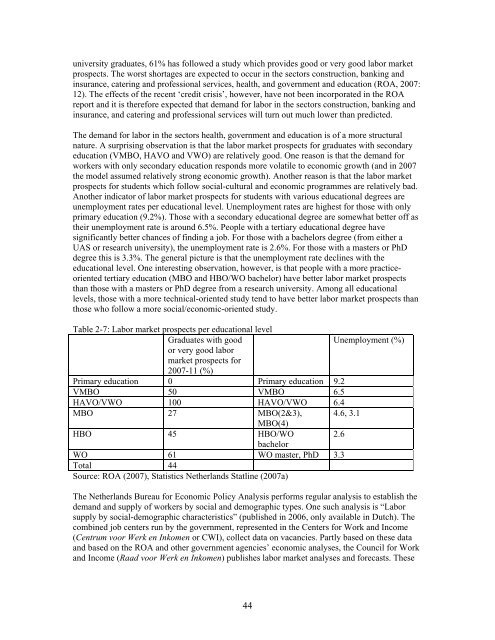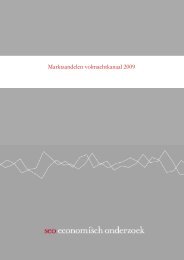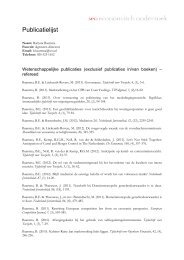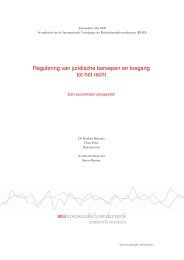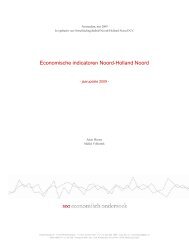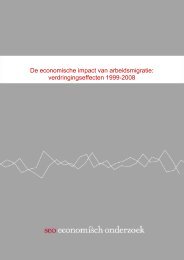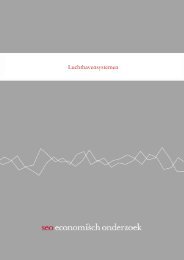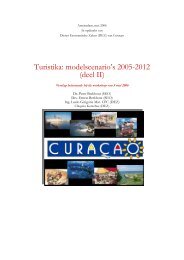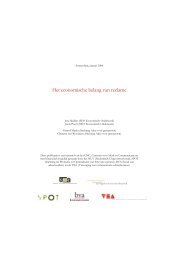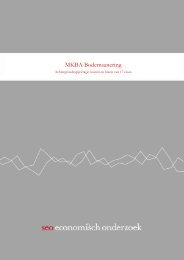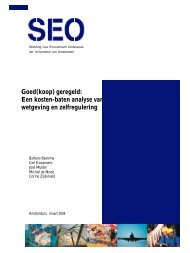university graduates, 61% has followed a study which provides good or very good labor marketprospects. The worst shortages are expected to occur in the sectors construction, banking andinsurance, catering and professional services, health, and government and education (ROA, 2007:12). The effects of the recent ‘credit crisis’, however, have not been incorporated in the ROAreport and it is therefore expected that demand for labor in the sectors construction, banking andinsurance, and catering and professional services will turn out much lower than predicted.The demand for labor in the sectors health, government and education is of a more structuralnature. A surprising observation is that the labor market prospects for graduates with secondaryeducation (VMBO, HAVO and VWO) are relatively good. One reason is that the demand forworkers with only secondary education responds more volatile to economic growth (and in 2007the model assumed relatively strong economic growth). Another reason is that the labor marketprospects for students which follow social-cultural and economic programmes are relatively bad.Another indicator of labor market prospects for students with various educational degrees areunemployment rates per educational level. Unemployment rates are highest for those with onlyprimary education (9.2%). Those with a secondary educational degree are somewhat better off astheir unemployment rate is around 6.5%. People with a tertiary educational degree havesignificantly better chances of finding a job. For those with a bachelors degree (from either aUAS or research university), the unemployment rate is 2.6%. For those with a masters or PhDdegree this is 3.3%. The general picture is that the unemployment rate declines with theeducational level. One interesting observation, however, is that people with a more practiceorientedtertiary education (MBO and HBO/WO bachelor) have better labor market prospectsthan those with a masters or PhD degree from a research university. Among all educationallevels, those with a more technical-oriented study tend to have better labor market prospects thanthose who follow a more social/economic-oriented study.Table 2-7: Labor market prospects per educational levelGraduates with goodUnemployment (%)or very good labormarket prospects for2007-11 (%)Primary education 0 Primary education 9.2VMBO 50 VMBO 6.5HAVO/VWO 100 HAVO/VWO 6.4MBO 27 MBO(2&3), 4.6, 3.1MBO(4)HBO 45 HBO/WO 2.6bachelorWO 61 WO master, PhD 3.3Total 44Source: ROA (2007), Statistics <strong>Netherlands</strong> Statline (2007a)The <strong>Netherlands</strong> Bureau for Economic Policy Analysis performs regular analysis to establish thedemand and supply of workers by social and demographic types. One such analysis is “Laborsupply by social-demographic characteristics” (published in 2006, only available in Dutch). Thecombined job centers run by the government, represented in the Centers for Work and Income(Centrum voor Werk en Inkomen or CWI), collect data on vacancies. Partly based on these dataand based on the ROA and other government agencies’ economic analyses, the Council for Workand Income (Raad voor Werk en Inkomen) publishes labor market analyses and forecasts. These44
also show a continued high demand for graduates, partly as a result of the ageing of the Dutchsociety (replacement effect) and the changing structure of the Dutch economy.2.4 Governance and the regulatory frameworkThe <strong>Netherlands</strong> aspires to use its tertiary education resources to help it move into a Europeanleadership position among knowledge-based economies by 2010. The government has strategiesto achieve this goal, which are set out in policy documents. The most recent strategic agenda, HetHoogste Goed (MinOCW, 2007b) delineates “an ambitious culture of learning” and “an excellentresearch climate” as the key objectives for the years to come.The official central government philosophy since the Hoger Onderwijs Autonomie en Kwaliteit(HOAK) policy paper has been to have as little central steering as possible, given the goals to beachieved (Jonge and Berger, 2006: 72). This is also known as the ‘state supervising model’ asopposed to the ‘state control model’. The described philosophy is expressed in the Wet op hetHoger Onderwijs en Wetenschappelijk <strong>Onderzoek</strong> (WHW) (Law on Higher Education andScientific Research), first issued in 1992 and frequently adapted since.2.4.1 Federal governanceFour ministries – the ministry of Finance, the ministry of Economic Affairs, the ministry ofEducation, Culture and Science and the ministry of Agriculture, Nature and Food Quality – areinvolved in formulating and executing tertiary education policy and resourcing toward this end(OECD, 2008a: 19). The primary responsibility for national funding, programmes and policyadvice in higher education is assumed by the Ministry of Education, Culture and Science. Theministry of Agriculture, Nature and Food Quality is responsible for the institutions within thedomain of agriculture and natural environment. Apart from the ministries, there is also a greatdeal of advisory bodies, consultative bodies, intermediary organizations and interest groups thatone way or the other influence policy-making. The next paragraph discusses the most importantof these organizations. A more complete list can be found in Annex D.2.4.2 Advisory bodiesThe Education Council (Onderwijsraad) is a permanent advisory body established by Act ofParliament in 1919. It provides advice, both solicited and unsolicited, to the Minister ofEducation, Sciences and Cultural Affairs and the Minister of Agriculture, Nature and FoodQuality (Onderwijsraad, 2009). Other bodies which advice the government on science aneducation are: the Socio-Economic Council (SER), the Advisory Council of Government Policy(WRR), and the Advisory Council for Science and Technology Policy (AWT).2.4.3 Consultative bodiesWith regard to higher education, the Minister consults within the Higher EducationConsultative Committee (HO Kamer) with the HBO Council (HBO-raad), Association ofUniversities (VSNU) and teaching hospitals and with the national research organizations (Weertand Broezerooy, 2007: 56). The national student organizations also have a say in higher educationpolicy through the Student Consultative Committee (Studentenkamer).45
- Page 1 and 2: Please cite this paper as:SEO Econo
- Page 6 and 7: 2.3 Higher education and the labor
- Page 8 and 9: 6.3 Mechanisms to promote regional
- Page 10 and 11: Table 4-4: Completion rates of diff
- Page 12 and 13: LSCA Life Sciences Center Amsterdam
- Page 14 and 15: such as regional authorities and th
- Page 17 and 18: 1. OVERVIEW OF THE REGION1.1 Introd
- Page 19 and 20: the southEastern part of Amsterdam
- Page 21 and 22: elatively bad accessibility of the
- Page 23 and 24: metropolitan area exceeded that of
- Page 25: egion suffer from one of the follow
- Page 28 and 29: Figure 1-7: Dropouts secondary educ
- Page 30 and 31: Figure 1-9: Employment in Amsterdam
- Page 32 and 33: high-tech sectors is relatively hig
- Page 34 and 35: 1.4.4 Labor market indicatorsTable
- Page 36 and 37: The central government is responsib
- Page 38 and 39: implemented. There is also an admin
- Page 41 and 42: 2 CHARACTERISTICS OF THE HIGHER EDU
- Page 43 and 44: Source: MinOCW (2007a: 68), EU (199
- Page 45 and 46: (ibid: 83). In part, this new syste
- Page 47 and 48: Table 2-1: Student enrolment at UAS
- Page 49 and 50: Figure 2-5: Students at universitie
- Page 51: Figure 2-6: Participation in tertia
- Page 55 and 56: not receive funding from the govern
- Page 57 and 58: of diplomas awarded and the number
- Page 59: decision is up to the HEI itself. I
- Page 62 and 63: Figure 3-1: Components of an innova
- Page 64 and 65: 3.2.3 National funding frameworkThe
- Page 66 and 67: challenge for the years to come wil
- Page 68 and 69: Figure 3-3: R&D expenditures in Noo
- Page 70 and 71: Amsterdam Topstad programme.Creativ
- Page 72 and 73: 3.5.3 Life SciencesGiven the high l
- Page 74 and 75: Figure 3-4: Employment in Amsterdam
- Page 76 and 77: years. Employment in the trade and
- Page 78 and 79: employment has no upward or downwar
- Page 80 and 81: and more efficient exploitation of
- Page 82 and 83: mostly happens in the context of R&
- Page 84 and 85: income related to IP rights. The fa
- Page 86 and 87: Figure 3-6: Regional innovation sys
- Page 88 and 89: HEIs to play this role, as it draws
- Page 91 and 92: 4 CONTRIBUTION OF TEACHING & LEARNI
- Page 93 and 94: housing market, on the ‘buying ma
- Page 95 and 96: transport, finance, financial manag
- Page 97 and 98: HvA participates in several initiat
- Page 99 and 100: 4.4 Student recruitment and regiona
- Page 101 and 102: 4.4.1.2 Recruitment of foreign stud
- Page 103 and 104:
• HvA has made its educational pr
- Page 105 and 106:
The HEIs have several external and
- Page 107 and 108:
Table 4-4: Completion rates of diff
- Page 109 and 110:
4.7 Enhancing the regional learning
- Page 111 and 112:
4.8 ConclusionTable 4-6: SWOTStreng
- Page 113:
Amsterdam is matched by a relative
- Page 116 and 117:
The challenge for future social pol
- Page 118 and 119:
The VU likewise develops research p
- Page 120 and 121:
directing, documentary directing, s
- Page 122 and 123:
the university to improve its energ
- Page 125 and 126:
6.1 Introduction6 CAPACITY BUILDING
- Page 127 and 128:
Figure 6-1: Organization chart Vrij
- Page 129 and 130:
There are also examples of more spe
- Page 131 and 132:
Box 6-2: Obstacles for collaboratio
- Page 133 and 134:
eyond labor market studies, there a
- Page 135 and 136:
7 CONCLUSIONS: MOVING BEYOND THE SE
- Page 137 and 138:
…requires different forms of coop
- Page 139 and 140:
at higher levels in order to mainta
- Page 141 and 142:
to increase the interaction between
- Page 143 and 144:
mobility in the world is slackening
- Page 145 and 146:
ecause they are better informed abo
- Page 147 and 148:
REFERENCESAalders, R., A. Bakkeren,
- Page 149 and 150:
EZ Amsterdam (2006), “Research Bu
- Page 151 and 152:
MinOCW (2007a), “The Education Sy
- Page 153 and 154:
SER (2008), “Duurzame Globaliseri
- Page 155:
Versleijen, A., van der Meulen, B.,
- Page 158 and 159:
Institution City Type ofHEIANNEX B:
- Page 160 and 161:
Groningenculture)Hogeschool Amsterd
- Page 163 and 164:
ANNEX C: KEY ECONOMIC INDICATORSTab
- Page 165 and 166:
ANNEX E: REGIONAL PARTNERSHIPS OF A
- Page 167 and 168:
AmsterdamUniversity CollegeOther re
- Page 169 and 170:
ANNEX F: BUSINESSES REPRESENTED IN
- Page 171 and 172:
GLOSSARYBologna DeclarationForeign


